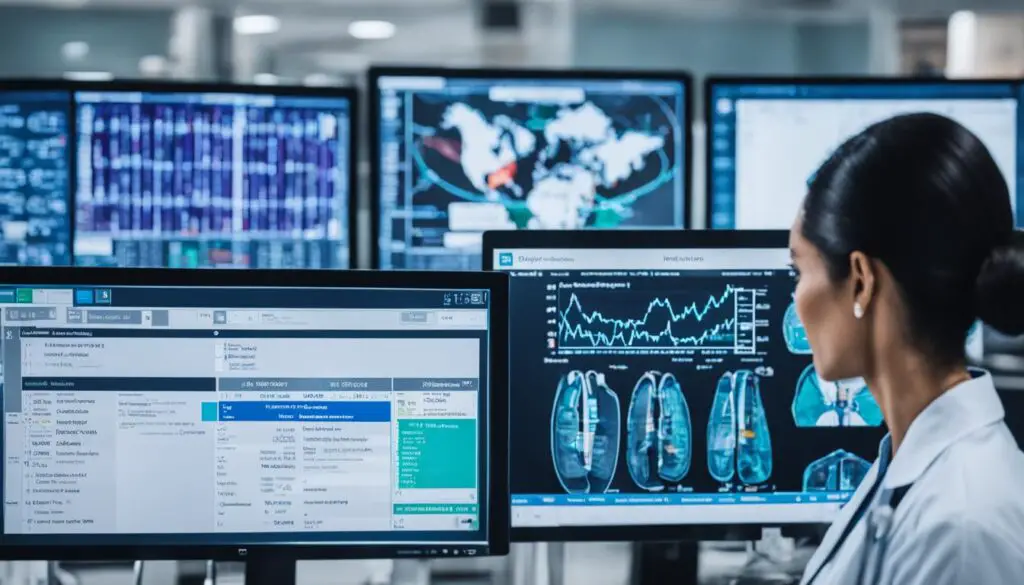
As healthcare systems continue to rely heavily on technology, there has been an increasing need for professionals who can bridge the gap between nursing and technology. This is where the role of an Informatics Nurse comes in.
An Informatics Nurse is responsible for managing healthcare informatics and nursing technology, including patient data management and utilization of clinical information systems. They play a vital role in driving healthcare innovation and ensuring that the latest advancements are integrated into patient care to deliver the best possible outcomes.
In this article, we will explore the role of an Informatics Nurse, including their job profile, required skills, entry opportunities and training, and global demand for this profession. We will also delve into the salary prospects and development opportunities available, as well as the future trends and innovations in informatics nursing.
Job Profile and Tasks
An Informatics Nurse is a vital component of the healthcare system, combining nursing expertise with technical proficiency to manage and optimize patient data and clinical information systems. They serve as a bridge between healthcare professionals and technological systems, applying their unique skillset to provide advanced patient care.
The key tasks of an Informatics Nurse include:
- Managing patient data and electronic health records (EHRs) to ensure accurate and up-to-date information.
- Collaborating with other healthcare professionals to implement and optimize clinical information systems.
- Providing training and support to staff using these systems.
- Analyzing data and generating reports to support evidence-based decision making.
- Staying up-to-date with technological advancements in healthcare and determining their impact on nursing practice.
To excel in this role, Informatics Nurses must possess a combination of nursing expertise and technical proficiency. Required skills include:
- A Bachelor of Science in Nursing (BSN) or higher degree.
- Experience working as a registered nurse.
- Proficiency in healthcare information systems and databases.
- Excellent communication, critical thinking, and problem-solving abilities.
- An interest in healthcare innovation and technology.
Informatics Nurses must be detail-oriented and organized, with a passion for optimizing healthcare systems and processes. They must also have the ability to synthesize complex data and present it to different audiences in a clear and concise manner.
Entry Opportunities and Training
Aspiring Informatics Nurses can explore various entry opportunities to kickstart their career in this field. To become an Informatics Nurse, one must have a background in nursing and training in healthcare informatics. While some organizations might accept a bachelor’s degree in nursing and a certificate in healthcare informatics, it is recommended to pursue a master’s degree in nursing informatics to gain a competitive edge in the job market.
Several universities and colleges offer relevant courses and degree programs to build a strong foundation in healthcare informatics. Coursework typically covers topics such as patient data management, clinical information systems, and healthcare innovation. Completing these programs can prepare candidates for an entry-level job in Informatics Nursing.
Additionally, obtaining relevant certifications can also increase the chances of getting hired. Certifications such as the Certified Professional in Healthcare Information and Management Systems (CPHIMS) and the Registered Health Information Administrator (RHIA) demonstrate one’s expertise in healthcare informatics.
Applicants can browse through job postings on healthcare job portals or directly apply at hospitals, healthcare organizations, and technology firms specializing in healthcare informatics. As with any other job, submitting a well-crafted resume and a cover letter that showcases one’s qualifications and skills can help boost the chances of landing an interview.
Global Demand for Informatics Nurses
Informatics Nurses are in high demand across the world, with countries like the United States, Canada, Australia, and the United Kingdom having a significant demand for professionals in this field. In the United States, the healthcare industry is projected to add over 2.3 million new jobs by 2026, with a considerable portion of these jobs being related to healthcare informatics, including Informatics Nurse roles.
Similarly, Europe has seen an increasing demand for Informatics Nurses, with a focus on implementing healthcare technology solutions and improving patient outcomes. Countries like Germany, the Netherlands, and Spain have been at the forefront of driving healthcare innovation in this field.
Other regions, such as Asia and the Middle East, are also experiencing growth in the demand for Informatics Nurses. Healthcare organizations in these regions are recognizing the value of implementing clinical information systems and digitizing patient data, leading to increased job opportunities for qualified professionals.


Informatics Nurse in the Healthcare Industry
Informatics Nurses are in high demand across various sectors and industries in the healthcare field. Some of the potential employers for Informatics Nurses include:
- Hospitals and healthcare organizations
- Healthcare technology companies
- Pharmaceutical and medical device companies
- Government agencies and public health organizations
Informatics Nurses can work in a variety of settings, including:
- Clinical settings, such as hospitals, outpatient clinics, and long-term care facilities
- Administrative roles, such as healthcare management and consulting
- Research and academic institutions
As the healthcare industry continues to evolve and become more reliant on technology, the demand for Informatics Nurses is only expected to increase.
Salary and Development Opportunities
Informatics Nurses play a critical role in managing patient data and integrating technology into healthcare. As a result, they are in demand, with average salaries ranging between $70,000-$90,000 per year, depending on experience, location, and industry.
Additionally, Informatics Nurses have numerous development opportunities available to them, with chances to increase their skills and advance their careers. Some of these opportunities include continuing education courses, advanced certifications, and leadership and management training.
| Factors Affecting Informatics Nurse Salary | Salary Range |
|---|---|
| Experience | $70,000-$90,000 (Entry to Mid-Level) |
| Location | $75,000-$115,000 (High-Cost of Living Cities) |
| Industry | $85,000-$105,000 (Pharmaceutical & Biotechnology) |
With the demand for healthcare technology professionals continuing to rise, Informatics Nurses can expect to have promising career prospects, with a potential for career advancement and salary growth.
Similar Jobs and Professions
Besides Informatics Nurse, various other professions share similar traits and functions. These roles are also essential in the healthcare informatics field. Some of these careers include:
- Medical Informatics Specialist
- Clinical Informatics Manager
- Healthcare Data Analyst
- Informatics Pharmacist
- Informatics Consultant
Although these careers differ in their specific responsibilities, they all require a blend of healthcare and technology expertise. Moreover, the salaries and promotion prospects among these professions vary. It is crucial to do extensive research and determine which role aligns with your skills and career goals.

Required Skills for Informatics Nurses
Informatics Nurses require a combination of technical and soft skills to perform their duties with proficiency. The technical skills needed include a solid understanding of healthcare information systems, expertise in data management, and knowledge of emerging technologies. Moreover, possessing soft skills like communication, critical thinking, and problem-solving is crucial for effective collaboration and patient care.
| Technical Skills | Soft Skills |
|---|---|
| Expertise in Electronic Health Records (EHRs) | Communication |
| Ability to design and implement clinical information systems | Critical thinking |
| Knowledge of data analytics and reporting | Problem-solving |
| Proficiency in security and privacy regulations | Collaboration |
To stay current with the ever-evolving healthcare technology landscape, Informatics Nurses must also pursue continuous learning and professional development in new technologies and healthcare practices.
Future Trends and Innovations in Informatics Nursing
As healthcare innovation continues to progress at a rapid pace, the future of informatics nursing looks promising, with a range of exciting advancements on the horizon. One key trend that is likely to emerge is the integration of artificial intelligence (AI) into patient care and data management. This can help informatics nurses analyze large volumes of data with greater accuracy, identify patterns and trends, accelerate diagnosis and treatment, and ultimately improve patient outcomes.
Another area of development is telemedicine, which enables remote patient monitoring and teleconsultations, reducing the need for patients to visit healthcare facilities in-person. This technology can enhance the role of informatics nurses in delivering high-quality care to patients, regardless of their location.
In addition, there is growing attention towards personalized medicine, with informatics nurses playing a central role in managing the complex data required to deliver targeted treatment plans to individual patients. As healthcare innovation continues to transform patient care, informatics nursing will be at the forefront of these advancements, driving industry-wide change and innovation.
Conclusion
Informatics Nurses play a crucial role in bridging the gap between nursing and technology, driving healthcare innovation and ensuring the efficient management of patient data. As outlined in this article, Informatics Nurses require a unique combination of technical and soft skills to excel in their role, and there are numerous entry opportunities and career advancement prospects available in this growing field.
As healthcare technology continues to evolve, the importance of Informatics Nurses will only increase. By staying up-to-date with emerging trends and innovations, these professionals can continue to provide advanced patient care and support healthcare organizations in achieving their objectives.
Questions and Answers
What is an Informatics Nurse?
An Informatics Nurse is a healthcare professional who bridges the gap between nursing and technology. They are responsible for managing patient data, utilizing clinical information systems, and driving healthcare innovation.
What are the specific tasks and responsibilities of an Informatics Nurse?
The tasks of an Informatics Nurse include managing patient data, implementing and maintaining healthcare information systems, providing training and support to healthcare staff, and collaborating with interdisciplinary teams to improve patient care outcomes.
What skills are required to become an Informatics Nurse?
To excel as an Informatics Nurse, one needs a combination of technical and soft skills. Technical skills include proficiency in healthcare information systems, data analysis, and familiarity with healthcare regulations. Soft skills like communication, problem-solving, and adaptability are equally important.
How can one enter the field of Informatics Nursing?
Entry opportunities in Informatics Nursing generally require a background in nursing and additional training in healthcare informatics. One can pursue certifications or advanced degrees in healthcare informatics or related fields to enhance their credentials and increase their job prospects.
Which countries have a high demand for Informatics Nurses?
The demand for Informatics Nurses is growing globally. Countries like the United States, United Kingdom, Canada, Australia, and Germany have particularly high demand in this profession.
Are there promotion prospects and development opportunities in Informatics Nursing?
Yes, Informatics Nurses can advance their careers by taking on leadership roles, pursuing advanced degrees, or specializing in a specific area of informatics nursing. There are also opportunities for professional development through conferences, workshops, and ongoing training programs.
What are some similar jobs or professions in healthcare informatics?
Some similar jobs or professions in healthcare informatics include Clinical Informatics Specialists, Healthcare Data Analysts, Nursing Informatics Specialists, and Health Information Managers.
